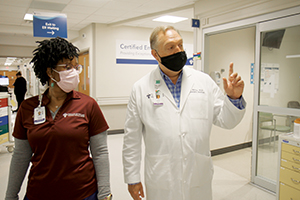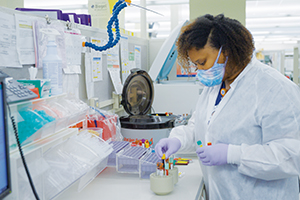ACHIEVEMENT CITATION
By LISA EISENHAUER
A simple, stigma-reducing approach to HIV testing at Our Lady of the Lake Regional Medical Center is lowering the rate of transmission of HIV and hepatitis C in Baton Rouge, Louisiana.

Social worker Priscar S. Thornton and Dr. James Rhorer, emergency physician, are part of the Opt-Out HIV and Hep C Program at Our Lady of the Lake Regional Medical Center in Baton Rouge, Louisiana. Rhorer is the principal investigator for the program, which provides the screenings on a routine basis for most emergency room patients. Thornton helps connect people who test positive to treatment and social services.
Every patient between the ages of 13 and 64 who comes to the four emergency rooms or one urgent care center operated by Our Lady of the Lake for any ailment is informed by their triage nurse that free HIV and hepatitis testing is routinely done and they will be tested, too, unless they request to opt-out.
The Opt-Out HIV and Hep C Program has helped the hospital identify and assist hundreds of people in the community who either didn't know they had the viruses or didn't know how to get treatment.
Since the HIV testing program started in 2014, the hospital says its impact has included dropping the rate of new AIDS diagnoses per 100,000 population in the Baton Rouge region from worst in the nation to 10th worst. In February 2020, Our Lady of the Lake began using the same opt-out approach to routinely screen patients in its emergency rooms for hepatitis C, a communicable disease and one that, like HIV, can be asymptomatic until it has progressed. Baton Rouge has a high incidence rate of hepatitis C, but reporting has been incomplete owing to limited resources and little public health follow-up, according to the hospital.
Scaling up
The Centers for Disease Control and Prevention cited the hospital's opt-out HIV testing when it recommended last year that emergency rooms and other medical settings offer routine opt-out HIV testing as part of the agency's plan to reduce new HIV infections in the United States by 90% by 2030. The CDC says up to 40% of new HIV infections are transmitted by people who do not know they have the virus.
Our Lady of the Lake staff has assisted in replicating the opt-out HIV program in the emergency department of a competitor hospital in Baton Rouge.
For its elegant approach to broadening HIV and hepatitis C testing to get people treatment earlier and reduce the community spread of both chronic infections, Our Lady of the Lake is the 2021 recipient of CHA's top annual honor — the Achievement Citation. CHA presented the award at the Catholic Health Assembly virtual conference June 15. Our Lady of the Lake is part of the Franciscan Missionaries of Our Lady Health System.
Measurable difference
Dr. James Rhorer is an emergency physician and Our Lady of the Lake's former medical director for emergency medicine. He leads the opt-out program as its principal investigator. When the CDC recognized the Opt-Out HIV and Hep C Program as a best practice, he told his staff they were making a measurable difference in the lives of patients and the health of the community. He calls the program "the manifestation of our ministry."
Rhorer says the benefits of the program are many. Those with HIV or hepatitis get linked to treatment and services and the risk that those individuals will infect others in the community can be wiped out.
He is hopeful that research will eventually lead to a cure for HIV as it has for hepatitis C. "But until then, it's not a death sentence and we are teaching our community as a whole to not treat people who are HIV positive like lepers," he says. "They contracted a medical illness and we can treat it, we can keep them healthy and we can keep them from spreading the disease."
The operating budget for the opt-out program is $317,000. The funding comes through grants which cover program costs, including full- and part-time salaries for a staff of six. Among the grantors are a charitable foundation run by Gilead Sciences, makers of some of the most widely used HIV drugs; the Louisiana Department of Health; and the city of Baton Rouge.
Routine orders
Data shows that most of those who are HIV positive in Louisiana are people of color who face socioeconomic challenges that limit their access to early diagnosis and treatment. Because many of the people in that segment of the community use emergency rooms as their safety net for medical care, Rhorer and others who helped establish the opt-out program decided that ERs would be the best place to initiate the HIV testing.
When an eligible patient is first seen at an Our Lady of the Lake ER, the electronic ordering system attached to the patient's electronic medical record generates a standard order for the HIV and hepatitis C tests. The ER triage nurses inform patients of the opt-out policy and draw blood for the HIV and hepatitis C tests. The hospital's lab sends an alert to the opt-out team when there is a positive result.
Social workers who are part of the program help patients with a positive result access HIV or AIDS treatment and apply for social services such as housing and food aid as needed.
For those with positive hepatitis C results, the hospital helps provide access to treatment, including through an innovative model set up by the state in partnership with a subsidiary of Gilead Sciences.
Psychological comfort
Rhorer says the opt-out process puts patients more at ease than one in which they are asked whether they want to be screened for HIV and hepatitis C. "I think maybe there's some psychological comfort that 'Oh, this hospital just does this, this is their thing, this is how they deliver their care so I'm just going to go along for the ride,'" he says.
About 30% of eligible patients undergo the HIV screenings, a percentage Our Lady of the Lake hopes to push higher. The number of annual tests done through the program increased from 34,896 given at three sites in 2014 to 93,063 tests given at six sites in the first 11 months of 2020. In those 11 months, the testing identified 47 previously undiagnosed infections and seven recent (acute) HIV infections. Patients with acute infections are considered to be at risk for transmitting the disease to others in part because they are unaware of their infectious state.
Normalizing HIV
Elidia "Anne" Dewitt, a nurse prac–titioner, is the program's coordinator. Her training in caring for HIV and AIDS patients began in the throes of the epidemic in the 1980s, when she worked with the first physician in Baton Rouge to treat AIDS patients at a time when little was known about the virus that caused it.

Lameeka Prophet works in the laboratory at Our Lady of the Lake Regional Medical Center that tests blood samples drawn as part of the Out-Opt HIV and Hep C Program. The hospital credits the program for identifying the viruses in hundreds of patients and getting them access to treatment and needed services.
"That was a life lesson because for a lot of these folks who had HIV, nobody else wanted to be around them, nobody wanted to touch them, because nobody really knew what they were dealing with," Dewitt says.
That stigma remains, if not as strongly, she says, and is one reason some of the people in high-risk populations don't get tested for HIV or don't reveal a positive diagnosis to anyone. Dewitt says the opt-out program helps to normalize the disease as just another health condition that can be successfully treated.
Adherence to antiretroviral medication regimens can reduce the viral loads of people with HIV to undetectable levels. When their viral load is that low, those with HIV no longer transmit the disease.
Part of Dewitt's role is to break the news of a positive HIV or hepatitis C test to patients. "I cancel whatever I'm doing, and make time for that patient," she says. "I go speak to the patient, their partner, their family, whoever's with them, to notify them of their diagnosis, counsel them, talk to them, answer their questions. And then the social workers come in with me and speak to them and make sure that they get linked to care."
Overcoming shock
Getting an HIV/AIDS or hepatitis C diagnosis can be overwhelming to patients who are often already struggling with other challenges, says social worker Priscar S. Thornton. And the shock can be compounded when the diagnosis is the unanticipated result of having come to an ER with something as minor as a sprained ankle or sore throat.
Thornton and her social worker colleagues in the opt-out program connect anyone diagnosed as having either virus but not receiving care to a clinic or a primary care provider who can begin therapy. "If they're looking for permanent housing, if they're looking for how to apply for Social Security benefits, if they're looking for support groups — there's an array of services there we try to make sure that we get them connected to," she says.